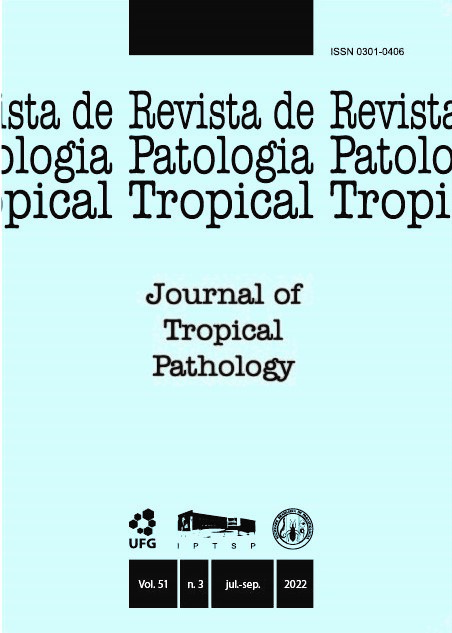Parasitological analysis of vegetables sold in supermarkets and free markets in the city of Taguatinga, Federal District, Brazil
DOI:
https://doi.org/10.5216/rpt.v51i3.73139Resumo
Parasitosis are the most common diseases in the world, they are responsible for relevant negative consequences in the individuals´ health. The consumption of vegetables in Brazil and in the world is common due to their high nutritional value and they are recommended to be included in the population´s diet. Contaminations in vegetables are most often caused by irrigation water which is contaminated by feces, other forms of contamination are through organic manure containing fecal waste and the contact of vegetables with animals where they are grown. This research evaluated the contamination in vegetables with the purpose of warning the community about hygiene and the correct approach of food handling in order to prevent parasitic infections, contributing to people´s health. Samples were collected from supermarkets and farmers´ markets, where we obtained a total of 30 samples that were analyzed using Hoffman, centrifugation and slide reading´s techniques. In all samples, parasites were found. In six samples non-pathogenic amoebas were found, however this finding means that there was contamination from human or animal feces. And, in the other 24 samples, parasitic structures that cause damage to health were found. This work showed a high level of contamination of the vegetables that are consumed daily by the population and the diseases caused by food which are a concern for the public health. Contaminated vegetables are dangerous considering the transport of parasites that may generate human infections, therefore the importance to create public policies in order to avoid parasitic infections.
KEY WORDS: Parasitic infections; food contamination; parasitology; food parasitology;neglected diseases.
Downloads
Downloads
Publicado
Como Citar
Edição
Seção
Licença
The manuscript submission must be accompanied by a letter signed by all authors stating their full name and email address, confirming that the manuscript or part of it has not been published or is under consideration for publication elsewhere, and agreeing to transfer copyright in all media and formats for Journal of Tropical Pathology.

